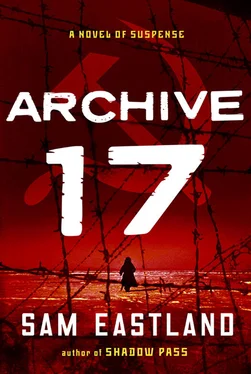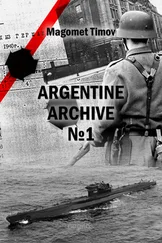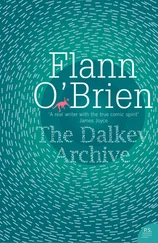Sam Eastland - Archive 17
Здесь есть возможность читать онлайн «Sam Eastland - Archive 17» весь текст электронной книги совершенно бесплатно (целиком полную версию без сокращений). В некоторых случаях можно слушать аудио, скачать через торрент в формате fb2 и присутствует краткое содержание. Жанр: Исторический детектив, на английском языке. Описание произведения, (предисловие) а так же отзывы посетителей доступны на портале библиотеки ЛибКат.
- Название:Archive 17
- Автор:
- Жанр:
- Год:неизвестен
- ISBN:нет данных
- Рейтинг книги:3 / 5. Голосов: 1
-
Избранное:Добавить в избранное
- Отзывы:
-
Ваша оценка:
- 60
- 1
- 2
- 3
- 4
- 5
Archive 17: краткое содержание, описание и аннотация
Предлагаем к чтению аннотацию, описание, краткое содержание или предисловие (зависит от того, что написал сам автор книги «Archive 17»). Если вы не нашли необходимую информацию о книге — напишите в комментариях, мы постараемся отыскать её.
Archive 17 — читать онлайн бесплатно полную книгу (весь текст) целиком
Ниже представлен текст книги, разбитый по страницам. Система сохранения места последней прочитанной страницы, позволяет с удобством читать онлайн бесплатно книгу «Archive 17», без необходимости каждый раз заново искать на чём Вы остановились. Поставьте закладку, и сможете в любой момент перейти на страницу, на которой закончили чтение.
Интервал:
Закладка:
“Then surely that is good news! You can bring him home now.”
With his thumb, Stalin pushed away the half-eaten tin of sardines. “Let me ask you, Major: If Pekkala has indeed located the gold, do you think it is possible that he might have decided to keep it for himself?”
Kirov laughed at the suggestion.
Stalin’s eyes turned glassy. “Comrade Major, do you find this a source of amusement?”
Kirov’s smile vanished like the flame blown off a match. “What I mean, Comrade Stalin, is have you seen the way Pekkala lives? That tiny apartment. The food he eats? The coat he wears? He gets his things from Linsky’s! You could hand Pekkala a whole bar of gold and he’d probably just use it as a paperweight.”
Stalin studied the young major with a mixture of bemusement and respect. “We are talking about more than a single bar of gold, Major Kirov.”
“But we are also talking about Pekkala!”
Stalin made a noise in the back of his throat. “I see your point. Nevertheless, Major, I’ve just received word that Pekkala has escaped from Borodok.”
“Escaped? How can that be? He is not even a prisoner!”
“Prisoner or not, he has disappeared, along with several men who were once part of the Kolchak Expedition. I am concerned that returning to Borodok has had a greater effect on Pekkala than I anticipated. His allegiances, the old and the new, have been brought into conflict. He may not want the gold for himself, but he has fallen in with people who do, one of whom, I fear, may be the colonel himself. Pekkala’s wish to deny me what is mine may be as strong as their desire to possess it.”
“You speak as if he has already betrayed you, which I refuse to believe he has done. The answer is simple, Comrade Stalin. Inspector Pekkala has been kidnapped.”
“Kidnapped?” Now it was Stalin’s turn to look surprised.
“Yes, undoubtedly. And who is in charge of rescuing him?”
“Assuming you are correct, as of this moment, you are.”
“Me?” spluttered Kirov. “But how on earth am I supposed to track him down?”
Stalin smashed his fist on the desk. “I don’t care! I want to know what happened to my gold! And when you find that Finnish sorcerer, kidnapped or otherwise, you will remind him that his duty is to the future, not the past.”
“If you truly want him found, why not send a company of soldiers? Why not a whole army? What good can I possibly do?”
“Precision is required here, Major Kirov. Sending an army after half a dozen men is like trying to remove a splinter from your eye with a pitchfork.”
“But Comrade Stalin, surely there must be people closer to the scene-”
“The reason I am sending you,” interrupted Stalin, “is the same reason I sent Pekkala after Kolchak. He knows you. He trusts you. He will think twice before he tears your head off. And if I am right that Inspector Pekkala has chosen to forget his duties, you may be the only person on this earth who can remind him what they are. And as for an army, you may have one if you want. By the time you walk out of this room, you will be able to have anything you desire.” Stalin breathed in sharply and unleashed a deafening shout. “Poskrebyshev!”
A moment later the double doors opened. The bald man appeared and clicked his heels.
“Do you have Major Kirov’s papers?”
Poskrebyshev held up the red identification booklet.
“Bring it to me.”
In a few strides, Poskrebyshev had crossed the room. He laid the passbook down on Stalin’s desk.
“Pen,” said Stalin.
Poskrebyshev lifted one from the top pocket of his tunic and handed it over.
Stalin opened the booklet, scribbled his signature inside, then held it out to Kirov.
Kirov saw that a page had been added to his identification book. His heart stumbled in his chest as he read what was written inside.
THE PERSON IDENTIFIED IN THIS DOCUMENT IS ACTING UNDER THE DIRECT ORDERS OF COMRADE STALIN.
DO NOT QUESTION OR DETAIN HIM.
HE IS AUTHORIZED TO WEAR CIVILIAN CLOTHES, TO CARRY WEAPONS, TO TRANSPORT PROHIBITED ITEMS, INCLUDING POISON, EXPLOSIVES, AND FOREIGN CURRENCY. HE MAY PASS INTO RESTRICTED AREAS AND MAY REQUISITION EQUIPMENT OF ALL TYPES, INCLUDING WEAPONS AND VEHICLES.
IF HE IS KILLED OR INJURED, IMMEDIATELY NOTIFY THE BUREAU OF SPECIAL OPERATIONS.
“Congratulations,” said Stalin. “You are now the holder of a Shadow Pass.”
Finding himself suddenly too nervous to speak, Kirov made do with a salute and turned to leave.
“Before you go …”
Stalin’s voice stopped Kirov in his tracks.
“Let me make one thing very clear, Major. If you fail to bring Pekkala back alive, I will not hesitate to call in others who will certainly bring him back dead. Now go, and find him quickly, any way you can.”
While they waited for the others to return, the two remaining Ostyaks drove their sleds back into the forest, out of sight of the tracks.
There, the caribou gathered beside a rocky outcrop and began to gnaw upon the brittle moss which grew in black scabs on the stone.
As Pekkala watched them eat, he remembered the taste of that moss. Only in winter, when he had completely exhausted his food supplies, did he resort to eating it. Mixing the brittle flakes with snow, he boiled them down until they disintegrated into a gelatinous black mass. Its taste was bitter, and the consistency so slimy that he often could not keep it down. He hoped it would not be their meal tonight.
It was getting dark now and Pekkala set about gathering wood for a fire, prising dead branches from the frozen ground. The flames would act as a beacon to ensure that the returning sleds did not overshoot them in the dark. Any smoke from the fire would be hidden in the snow clouds, so they would not be spotted from the camp.
The Ostyaks, meanwhile, took up their antique flintlock rifles. Moving on large round snowshoes made from bent willow and laced with honey-colored bands of animal gut, they vanished into the forest in search of food.
Only minutes had gone by when Pekkala heard the muffled crack of gunfire. When the Ostyaks reappeared, one of them was carrying two dead rabbits, their long ears clutched in his fist.
With the help of some gunpowder emptied from a bullet cartridge, Pekkala soon had a fire going. Pine branches crackled and white smoke bloomed from the skeletal branches of white birch.
As soon as he departed from the Kremlin, Kirov drove straight to his office, gathered up a few things for the journey, then traveled to the railway junction where he had last seen Pekkala.
His hastily conceived plan was to climb aboard the first train headed east and not to stop until he reached the camp at Borodok. Once there, he would commandeer whatever men and supplies were available and set out in search of the men who had kidnapped Pekkala.
Arriving at the station, Kirov was dismayed to find no trains at the platform. At first, the whole place appeared deserted, but then the door to the guard shack opened and a man in dark blue overalls stepped out to meet him.
It was Edvard Kasinec, master of the V-4 junction.
“When is the next train leaving?” asked Kirov.
“Not for another three days,” Kasinec replied, “but you must understand, Comrade Major-the only passengers who go through here are convicts bound for Siberia.”
“I realize that. Siberia is where I need to go.”
“Major, I assure you there are more comfortable ways to get there than in the wagons of a prison transport.”
“My destination is a prison. Borodok, to be precise.”
Kasinec’s eyebrows arched with surprise. “What could possess a man to go there of his own free will?”
Kirov was only halfway through his explanation when Kasinec, hearing Pekkala’s name, ushered him into the station house.
Читать дальшеИнтервал:
Закладка:
Похожие книги на «Archive 17»
Представляем Вашему вниманию похожие книги на «Archive 17» списком для выбора. Мы отобрали схожую по названию и смыслу литературу в надежде предоставить читателям больше вариантов отыскать новые, интересные, ещё непрочитанные произведения.
Обсуждение, отзывы о книге «Archive 17» и просто собственные мнения читателей. Оставьте ваши комментарии, напишите, что Вы думаете о произведении, его смысле или главных героях. Укажите что конкретно понравилось, а что нет, и почему Вы так считаете.











